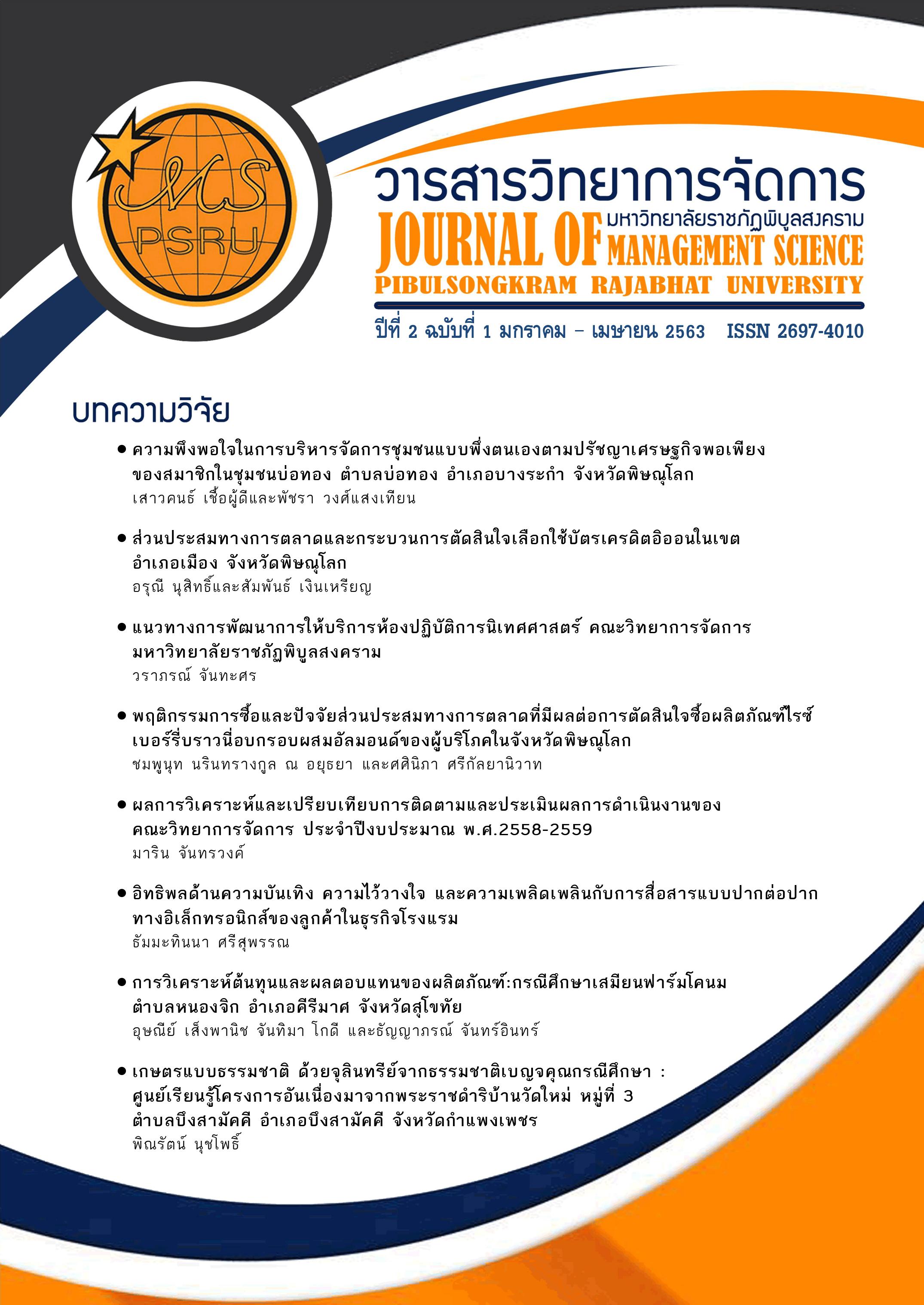อิทธิพลด้านความบันเทิง ความไว้วางใจ และความเพลิดเพลิน กับการสื่อสารแบบปากต่อปากทางอิเล็กทรอนิกส์ของลูกค้า ในธุรกิจโรงแรม
คำสำคัญ:
การสื่อสารแบบปากต่อปากทางอิเล็กทรอนิกส์, ความไว้วางใจ, ความบันเทิง, ความเพลิดเพลินบทคัดย่อ
การวิจัยครั้งนี้มีวัตถุประสงค์ เพื่อศึกษาปัจจัยด้านความบันเทิง ความไว้วางใจ และความเพลิดเพลินที่ส่งผลต่อการสื่อสารแบบปากต่อปากทางอิเล็กทรอนิกส์ของลูกค้าผู้ใช้บริการโรงแรมในจังหวัดพิษณุโลกที่ใช้เครือข่ายสังคมออนไลน์ มีการเก็บรวบรวมข้อมูลด้วยแบบสอบถามกับลูกค้าของโรงแรมในจังหวัดพิษณุโลกที่ใช้เครือข่ายสังคมออนไลน์จำนวน 400 ตัวอย่าง การวิเคราะห์ข้อมูลใช้การวิเคราะห์ ความถี่ ร้อยละ ค่าเฉลี่ย ส่วนเบี่ยงเบนมาตรฐาน และการวิเคราะห์ถดถอยเชิงพหุคูณ การวิจัยพบว่า ระดับการสื่อสารแบบปากต่อปากทางอิเล็กทรอนิกส์ของลูกค้าซึ่งเป็นลูกค้าของโรงแรมในจังหวัดพิษณุโลกที่ใช้เครือข่ายสังคมออนไลน์อยู่ในระดับมาก ความไว้วางใจอยู่ในระดับมากที่สุดความบันเทิงและความเพลิดเพลินอยู่ในระดับมาก ตามลำดับ สำหรับผลการวิเคราะห์ความถดถอยพหุคูณ พบว่า ค่าอิทธิพลของตัวแปรต้นทั้งหมดที่ประกอบด้วย ความบันเทิง ความไว้วางใจ และความเพลิดเพลินสามารถร่วมกันพยากรณ์ความผูกพันของลูกค้าได้ร้อยละ 47.60 โดยปัจจัยที่มีอิทธิพลต่อการสื่อสารแบบปากต่อปากทางอิเล็กทรอนิกส์ของลูกค้ามากที่สุดคือ ความไว้วางใจ ความบันเทิง และความเพลิดเพลิน ตามลำดับ
เอกสารอ้างอิง
ชฎาภา อนันต์กิตติกุล. (2554). ความสัมพันธ์ระหว่างพฤติกรรมการใช้เว็บไซต์เครือข่ายสังคมกับความผูกพันทุ่มเทของลูกค้า. วิทยานิพนธ์การจัดการมหาบัณฑิตสาขาเทคโนโลยีการจัดการ. มหาวิทยาลัยเทคโนโลยีสุรนารี. นครราชสีมา.
ธัมมะทินนา ศรีสุพรรณ. (2560). ความสัมพันธ์ระหว่างการตลาดออนไลน์กับความผูกพันของลูกค้าในธุรกิจโรงแรม. รายงานสืบเนื่องจากการประชุมวิชาการระดับชาติ วิทยาการจัดการวิชาการ 2017 มหาวิทยาลัยราชภัฎเชียงราย, , 286-294.
Baldus, J.B. (2015). Online brand community engagement: Scale development and validation. Journal of Business Research, 68(2015), 978-985.
Durmus, B., Ulusu, Y., & Erdem, S. (2013). Which dimentions affect private shopping e-customer loyalty?. Procedia-Social and Behavior Sciences, 99, 420-427.
Ergun, H. S., & Kuscu, Z. K. (2013). Innovation orientation, marketing orientation and e-loyalty: Evidence from Turkish e-commerce customers. Procedia-Social and Behavioral Sciences, 99, 509-516.
Gummerus, J., Liljander, V., Weman, E., & Pihlstrom, M. (2012). Customer engagement in a facebook brand community. Management Research Review, 35(9), 857-877.
Hsu, C-L., Chang, K. C., & Chen, M.-C. (2012). The impact od website quality on customer satisfaction and purchase intention: Perceived playfulness and perceived flow as mediators. Information System Electronic Business Management, 10, 549-570.
Jahn, B., Kunz, W. (2012) How to transform consumers into fans of your brand. Journal of Service Management, 23(3), 344-361.
Johnson, D. S., & Lowe, B. (2014). Emotional support, percieved corporate ownership and skepticism toward out-group in virual communities. Journal of Interactivity Marketing, 29(1), 1-10.
Lim, J. S., Hwang, Y., Kim, S., & Biocca, F. A. (2015). How social media engagement leads to sports channel loyalty: Mediating roles of social presence and channel commitment. Computer in Human Behavior, 46(2), 158-167.
Shi, S., Chen, Y., Chow, S.W. (2016). Key values driving continued interaction on brand pages in social media: An examination across genders. Computers in Human Behavior, 62(2016), 578-589.
Zheng, X., Cheung, M.K.C., Lee,.K.O.M., Liang, L. (2014). Building brand loyalty through user engagement in social networking sites. Information Technology & People, 28(1), 90-106.
ดาวน์โหลด
เผยแพร่แล้ว
รูปแบบการอ้างอิง
ฉบับ
ประเภทบทความ
สัญญาอนุญาต
บทความที่ได้รับการตีพิมพ์ในวารสารวิทยาการจัดการมหาวิทยาลัยราชภัฏพิบูลสงคราม เป็นลิขสิทธิ์ของ คณะวิทยาการจัดการ มหาวิทยาลัยราชภัฎพิบูลสงคราม บทความที่ลงพิมพ์ใน วารสารวิทยาการจัดการมหาวิทยาลัยราชภัฎพิบูลสงคราม ถือว่าเป็นความเห็นส่วนตัวของผู้เขียน คณะบรรณาธิการไม่จำเป็นต้องเห็นด้วย ผู้เขียนต้องรับผิดชอบต่อบทความของตนเอง



